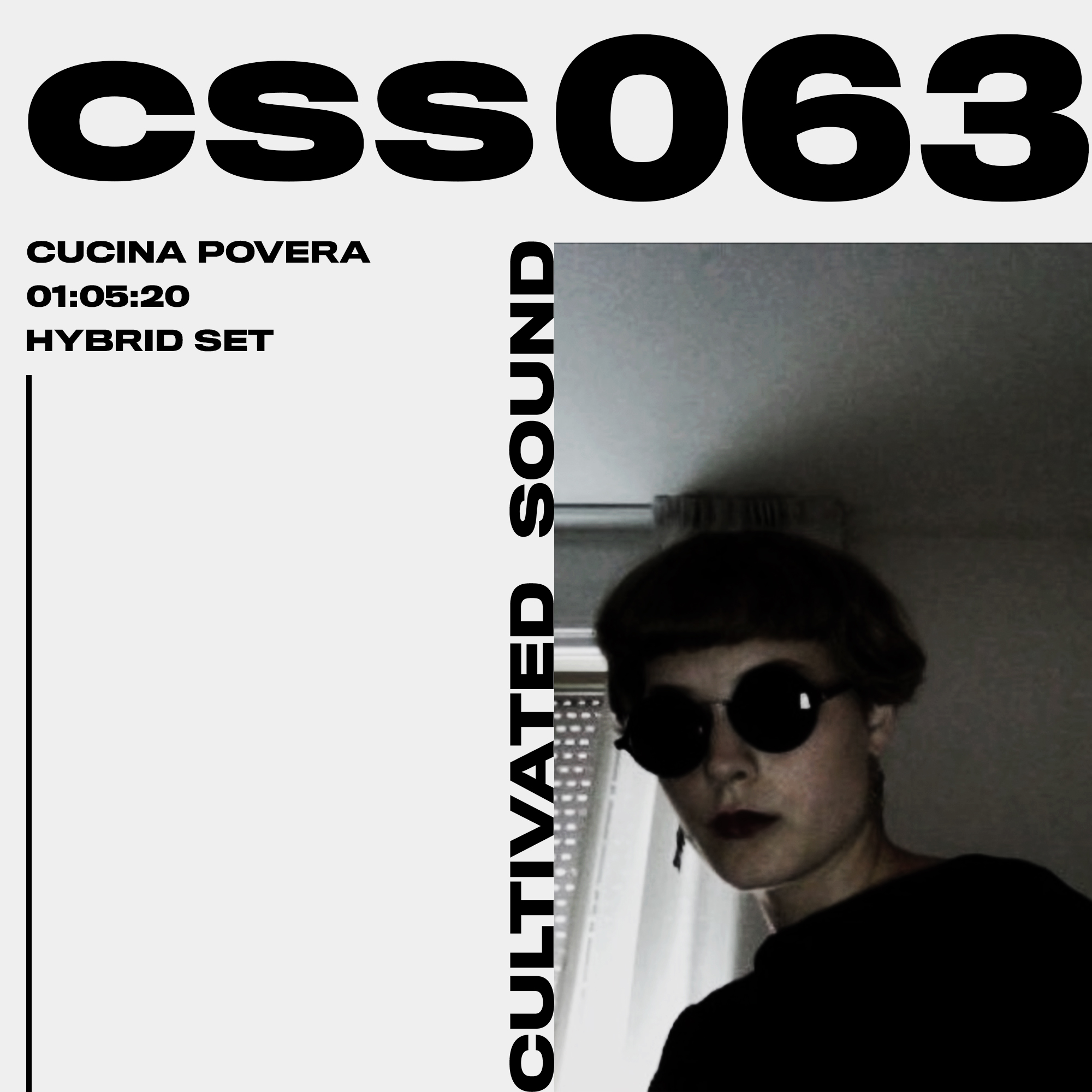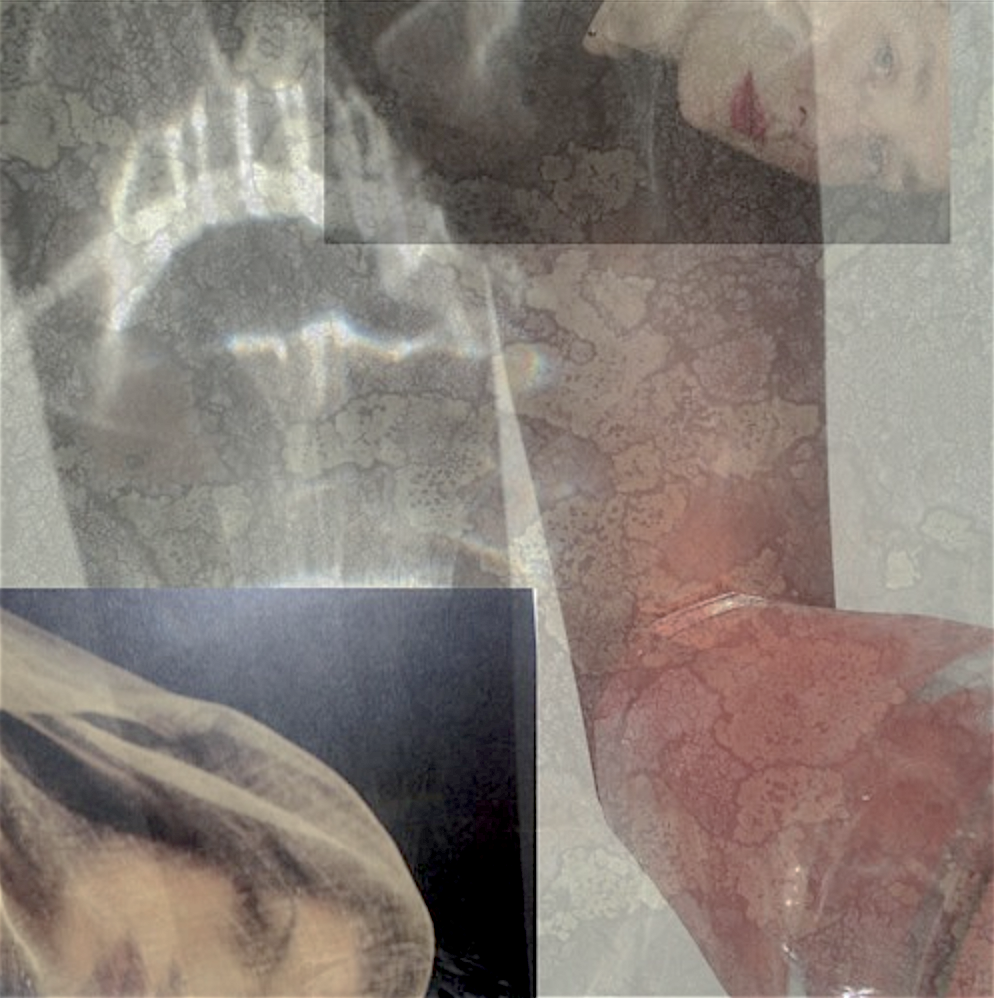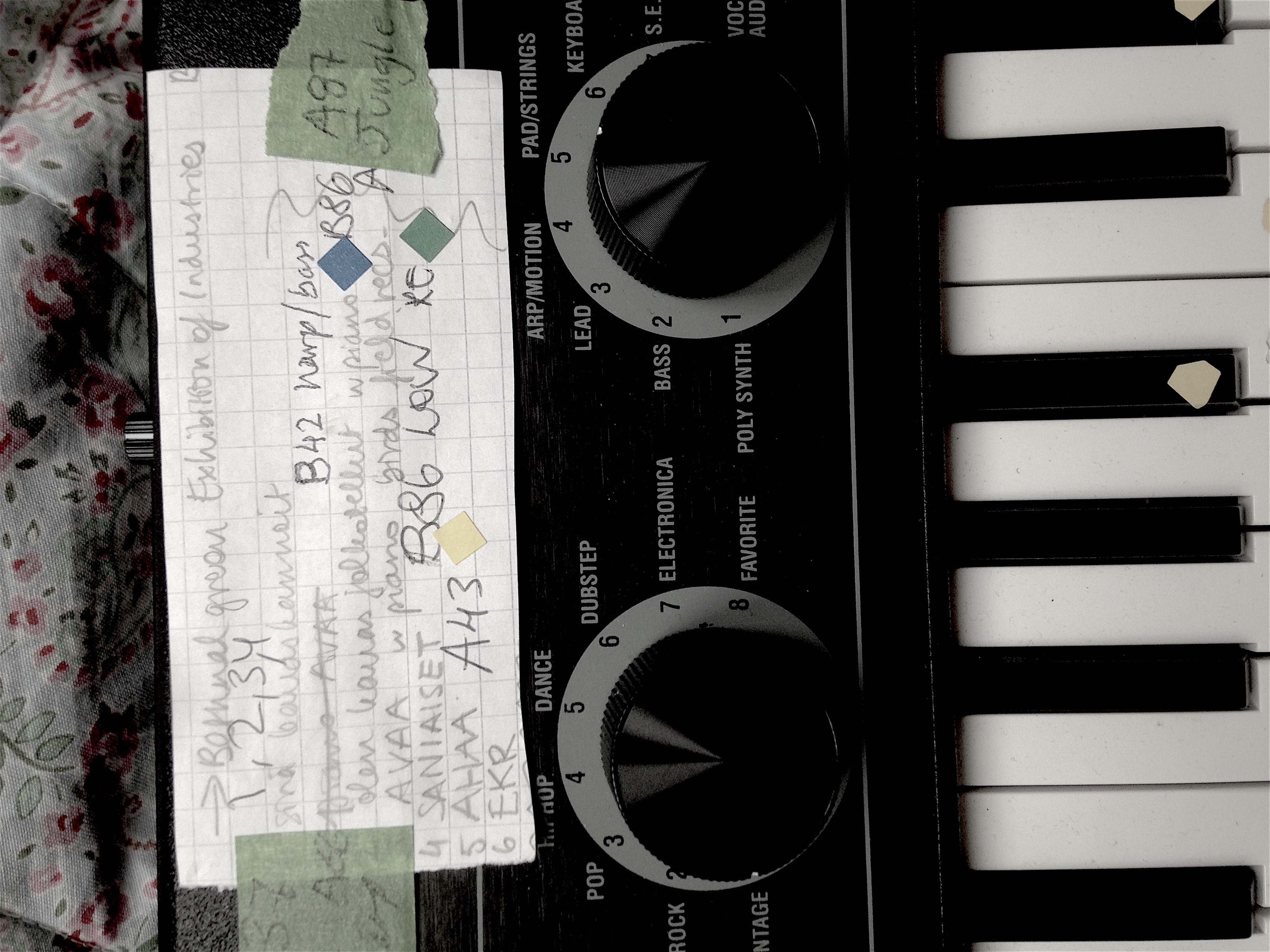CULTIVATED SOUND
CSS063: Cucina Povera[Hybrid Set]
06132019.
Text. Chamberlain Zhang
Text. Chamberlain Zhang
This hybrid set from Cucina Povera, CSS063, exploration with many sonic territories, she uses a Boss RE20 space echo pedal during her recording.
Cucina Povera aka Maria Rossi Finnish-born Luxembourgish (formerly of Tarantula and Luxos) is a vocalist-synthesist who experiments with layered vocals, effects and found sound.

When you recorded this mix where were you and what are some ideas you explored from this mix?
Cucina Povera: I recorded the mix in my old flat in Govanhill, Glasgow. I recently moved away from the city and so this mix was a bit of a nostalgic exercise. However, it looks forward to future adventures. I included music by many talented Glasgow musicians, so in a way it is a break-up album or an elegy to Glasgow, a city that has been both dreamy and horrendous to me. The way I approach making a mix nowadays is twofold : I try to only include unreleased demos or practice recordings from various own and collaborative projects. This way I get to disseminate more interesting and undiscovered work. For me music is always a collaboration and by making a mix I am dependent on what someone else has produced. It's a really nice exercise. I also like to make sure that the mix makes sense in terms of its component parts sounding comfortable next to each other. This is something I've only started to focus on very recently. I used to be more experimental and things would come out jarring and it sounded like the tracks were a little uneasy about their placement. When you listen to and love the songs more, putting them in amongst the right company becomes a lot easier. I've experimented with various FX chains and particularly an analog tape echo unit and putting existing recordings through it. I thought that for this mix it would be fun to tweak things within a such an environment, I like when things are a little bit off, a little scuzzy and "warm" sounding.
Tell us a little bit about Zoom and your musical progression and development of this EP.
Cucina Povera: The Zoom LP is a collection of sketches I first sent to Michael who puts my records out back in 2017. He got back to me saying that he really liked them. He rode the escalator especially when listening to the files for the first time and wanted to put out a record. I initially refused based on the idea that they were sketches and I felt embarrassed of their rawness. Instead I worked on some of the motifs a little and the result was Hilja, my 2018 debut record. More recently I warmed to the idea of the Zooms being out. Even though it's weird they're out in the world as stand-alone works of art, I like the aspect of vulnerability the songs evoke, because they are not perfect. Nothing ever will be and the key for me as an artist is to let go of the notion of perfection because otherwise nothing would otherwise get made. I am extremely productive and make lots of new songs all the time, but not a lot of it will see the light of day so I am actually very glad the Zoom sketches are out there. I objectively think it will be a unique album in amongst what gets released nowadays, and this is something I genuinely feel proud of.
Cucina Povera: I recorded the mix in my old flat in Govanhill, Glasgow. I recently moved away from the city and so this mix was a bit of a nostalgic exercise. However, it looks forward to future adventures. I included music by many talented Glasgow musicians, so in a way it is a break-up album or an elegy to Glasgow, a city that has been both dreamy and horrendous to me. The way I approach making a mix nowadays is twofold : I try to only include unreleased demos or practice recordings from various own and collaborative projects. This way I get to disseminate more interesting and undiscovered work. For me music is always a collaboration and by making a mix I am dependent on what someone else has produced. It's a really nice exercise. I also like to make sure that the mix makes sense in terms of its component parts sounding comfortable next to each other. This is something I've only started to focus on very recently. I used to be more experimental and things would come out jarring and it sounded like the tracks were a little uneasy about their placement. When you listen to and love the songs more, putting them in amongst the right company becomes a lot easier. I've experimented with various FX chains and particularly an analog tape echo unit and putting existing recordings through it. I thought that for this mix it would be fun to tweak things within a such an environment, I like when things are a little bit off, a little scuzzy and "warm" sounding.
Tell us a little bit about Zoom and your musical progression and development of this EP.
Cucina Povera: The Zoom LP is a collection of sketches I first sent to Michael who puts my records out back in 2017. He got back to me saying that he really liked them. He rode the escalator especially when listening to the files for the first time and wanted to put out a record. I initially refused based on the idea that they were sketches and I felt embarrassed of their rawness. Instead I worked on some of the motifs a little and the result was Hilja, my 2018 debut record. More recently I warmed to the idea of the Zooms being out. Even though it's weird they're out in the world as stand-alone works of art, I like the aspect of vulnerability the songs evoke, because they are not perfect. Nothing ever will be and the key for me as an artist is to let go of the notion of perfection because otherwise nothing would otherwise get made. I am extremely productive and make lots of new songs all the time, but not a lot of it will see the light of day so I am actually very glad the Zoom sketches are out there. I objectively think it will be a unique album in amongst what gets released nowadays, and this is something I genuinely feel proud of.
How do you think of the use of voice/vocal in your creative process?
CP: I use voice mostly because I deem it to be my area of expertise, and it's something I feel most comfortable doing. I also love synthesis and I like thinking of the voice as analogous to that system, putting it through certain processes and filters will alter the quality of the sound but from a more embodied perspective. I like how singing comes from the body, it is economical to travel with and is a challenge to take good care of. In a way, taking care of my instrument means taking better care of myself, so being a singer theoretically helps my mental and physical health a little bit, forcing me to think about some choices that I make. I love being around people but I also tend towards introversion so singing in front of people genuinely terrifies me still, and this is something I think will trouble me for some more time. I have learnt that certain processes such as fasting and meditation make for a less nervous performance. I also feel that other people being so genuinely appreciative and supportive really helps me battle the nerves. I am still right at the very start of all this, so it has been lovely to be able to share my work and connect with so many people through music. It is the thing that gets me up in the morning.
How did you get into making music/sound?
CP: I've been into creating songs since I was a child, I remember playing this melodica in my childhood home in Luxembourg when I was maybe 5 and the feeling of elation and pride that came from playing silly and simple melodies. I studied classical piano and theory for 10 years so I have a bit of the technical training in the background as well. I also always liked math but preferred it it the applied form that music took. My dad was a director of a church choir growing up and so a lot of religious music has also undoubtedly informed my compositions. He also plays the clarinet, guitar and bass so there's been something around the house all the time. The main thing was to get to take piano, guitar and theory lessons at the Conservatoire Nationale very cheaply, so music was always accessible growing up. I remember starting going to gigs at 16, Sonic Youth were probably the most inspirational gig that I saw in the tiny Atelier gig venue in Lux. That place always got very sweaty and intense. Then a couple of years later I saw Autechre play a pitch-dark Exit07, which got me into darker techno sounds. I travelled to Detroit for the Detroit Electronic Music Festival with a friend when I was 21 and lived in Montreal - getting to witness gigs by some of the most interesting names in techno and house was genuinely one of the most formative and inspiring experiences for me.


What do you think of music in relation to sound?
CP: I love all sound and I try not to judge them, this is why it becomes alienating when recordings are totally wiped clean of all imperfections, leaks, parasites, accidents, breathiness etc. I love hearing the grain, or the texture which tells the story of that particular day and those people involved in the recording. I recently recorded something very exciting in a church in Halifax with some excellent musicians from Brooklyn. This was an incredible resonant tall space I would not have encountered otherwise, and meeting the other musicians and having that situation was so completely incredible and I felt lucky to be there doing this really unique thing with some very talented people. Everything at that moment felt right and that things started to make a lot more sense aesthetically. It was one of those open-ended moments that made me feel like I could do music for a really long time and that I will do everything in my power to make that happen. Music triggers some of the strongest emotional responses in the listener. Isn’t it interesting that people from different cultures will often agree if a composition makes them feel happy or sad. We don’t hear words in music we hear the meaning of words. I’m fascinated by how music is the universal language of emotion.
Cucina Povera a vocalist-synthesist who experiments
with layered vocals, effects and found sound
with layered vocals, effects and found sound
What are some of your musical influences?CP: I have very few external influences, other than people that I meet to play with. Their influence on my music is more dynamic and tied to the logistics of the moment. I enjoy sharing ideas and tips but I don't have anyone whose practice I seek to emulate. I find interesting music all the time but I do not accord the development of my own sound to any kind of musical tradition or established approach. I reject the inclusion under minimalism, because although elementally sparse, my music is really florid in harmonies and melodic hooks and other small details. I also reject a medievalist classing, it's maybe a harmonically stylistic thing I emulate unintentionally but it's maybe an easy comparison point for something that has no precedent really. I mostly admire my friend Katie Shambles who has taught me to not give a fuck about other people's opinions. I admire her courage to power ahead and make amazing things happen in a tough city like Glasgow where the scene can otherwise get insular and stuffy. If there's anyone I emulate it's probably her. We are a good team and I hope to work with her for many years to come.
What are your ideas on improvisation in relation to your composition?CP: I was having this chat with my friend the other day how being classically trained enables you to easily improvise because knowing the rules allows you to break them productively etc. But it does not have to be a classical training, it just so happens to be my case. It can be anything, as long as you start from an established structure and then take a few detours within that. The end result will vary but the principle remains the same. Another thing I really like about improvisation is that it forces you to listen to the other musicians. Properly listening is an essential life skill and difficult to learn if you lead an insular existence like me. So music (improvisation) really is my main way of relating to people who are not me, and it feels really strange to try to think and speak about these things in English, because they require no explanation when played out loud with instruments.
Can you tell us more on the connection between the spirit world and stark materialism? CP: I like to think about a dualism of these two. I'm inherently anchored in the reality of matter and beings around me, I try to make it so that their struggles are mine, and my joys can be theirs. When I really am having a strange and turbulent time of life, I accord some importance to spiritual things but this makes me feel disconnected from the way that I am used to seeing time. I think addressing both spirit and matter is very important for the simple reason that then you might start to understand where people come from when they are telling you about their life. I feel music is a particularly spiritual practice, and I feel less materially connected when I am playing on my own. When I play with others I also feel a disconnect but this is probably down to not being so used to creating with others to the extent that I would like to. I think of creativity as a kind or procreation, so inevitably you have partners in that process and the result has a life of its own and both a physical and spiritual place in the world. I do not accord much importance to the visual element in my performance because there is a lot going on in the sound. I don't multitask well and respect performers who do both with ease. The visual can serve for someone to be able to decode my practice though, so I have started paying a little bit of attention to it in terms of providing a stylistic "metaphor."
06132019.
Text.Chamberlain Zhang
CULTIVATED SOUND.

